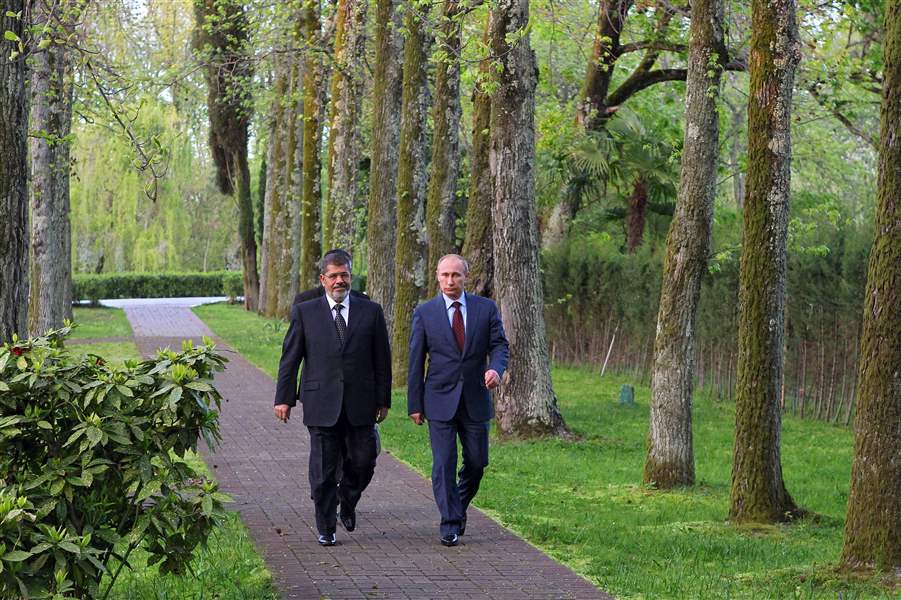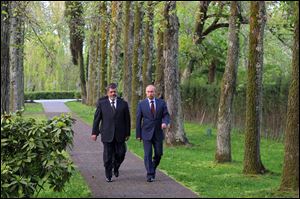
Egypt's Morsi says he will reshuffle Cabinet amid turmoil over judiciary, economy
4/20/2013
Russian President Vladimir Putin, right, and Egyptian President Mohammed Morsi walk together Friday after talks in the Black Sea resort of Sochi, Russia.
ASSOCIATED PRESS

Russian President Vladimir Putin, right, and Egyptian President Mohammed Morsi walk together Friday after talks in the Black Sea resort of Sochi, Russia.
CAIRO — Egypt's President Mohammed Morsi defended his handling of some of the nation's most pressing problems in a nearly two-hour television interview today, and pledged to appoint new Cabinet ministers in a move that could ease the country's deep political polarization.
Reshuffling the Cabinet has been a key demand of the nation's largely liberal and secular opposition, which is at odds with Morsi's Islamist backers over a myriad of issues that have surfaced since the 2011 uprising that ousted longtime autocrat Hosni Mubarak.
In the interview with Al-Jazeera, Morsi said the Cabinet changes would involve a number of key ministries, although he did not say how many. He also did not give a timeline or say which ministries would be affected.
It would be the second reshuffle since Morsi took office in July. The last ministerial shake-up in January led to the appointment of a new interior minister to oversee the police force. Rights groups allege that since Mohammed Ibrahim took the post, police have used excessive force, killing dozens of people nationwide in protests against Morsi.
There is no guarantee that a reshuffle of Cabinet posts would help bridge the deepening divide between Morsi's opponents and supporters, but it could help the country build political consensus around painful austerity measures needed to secure a nearly $5 billion loan from the International Monetary Fund.
"I do these changes based on what is best for the people," Morsi said. "The aim is to fulfill what is best."
The interview aired a day after violent street clashes erupted over whether the judiciary was being allowed to act independently. It also fell on the same day that an Egyptian court ordered the release of deposed President Mubarak pending further investigation into corruption charges. He will continue to be imprisoned on two other corruption cases.
Friday's violence erupted after the president's Muslim Brotherhood backers took to the streets to call for a "cleansing" of the judiciary and for loyalists of the former regime to be purged from state institutions. Egypt's secular-minded and liberal opposition rejected their call. They deemed it a cover for upcoming measures by Morsi and the country's temporary parliament to liquidate the judiciary and infuse their own members as a means to monopolize the judicial branch.
Morsi sought to allay those fears, telling Al-Jazeera that he was among those imprisoned under Mubarak for speaking out in favor of an independent judiciary away from presidential control.
"I hear the words purging the judiciary in the framework of people's worries," he said. "This worry is from people who see recent verdicts that do not live up to their expectations."
"The acquittals of former regime figures worries people," he said. "We can appreciate this worry."
The judiciary has been a significant battleground in the political unrest that has swept Egypt. It is the sole branch of government not dominated by Morsi's Islamist allies.
On his relationship with the Brotherhood, Morsi acknowledged he once headed the group's political party and was their candidate for president.
"But the president who was elected for Egypt is the president of all Egyptians," he said, denying that the Brotherhood was running his administration from behind the scenes.
He said his administration and the opposition agree on the country's goals, but differ on the way to achieve them.
He also deflected reports that there was a rift between him and the country's powerful military, from which the past four presidents have hailed. Morsi is the first civilian and first Islamist president to be elected in the country's first free presidential race.
He said that the presidency and the army are "on the same side."
Morsi needs the military and police to help secure the country amid protests against his rule. He reported there were around 1,200 protests in February and March alone, but insisted this did not reflect waning popularity for his rule.
"Egyptians are very wise and able to know who works for them and who works against them," he said.
Morsi said he believes his popularity is growing by the day, although his opponents, including liberals, socialists and ultraconservative Islamists, contend the government is not being transparent about economic measures that could further hurt Egypt's poor. The IMF loan is linked to economic reforms.
A team from IMF left Egypt this week without broad backing from Morsi's opponents to the terms of the loan, which they said have not been made public.
The loan is seen as critical to boosting investor confidence in Egypt and freeing up around $15 billion in other international aid and investments the country desperately needs. Foreign reserves, needed to pay for vital subsidies that millions rely on for survival, stand at $13.4 billion, less than two-thirds what they were prior to the uprising.
Morsi said he will not accept conditions attached to any loan and said Egypt was not to blame for talks about the loan that have dragged on for more than a year. He said his government was acting transparently.
"There is continuous dialogue about what is best for Egyptians in the future so that we do not enter a phase that imposes price hikes and other things," he said.
Senior IMF officials say Egypt needs to restore confidence in its economy and foster political stability. IMF Managing Director Christine Lagarde said recently that "there is clearly more work to be done" regarding discussions over the loan for Egypt.
Local media have sharply criticized Morsi for his handling of the country in the 10 months he has been in office.
A number of complaints filed by Islamists and Brotherhood lawyers against media personalities have further outraged rights advocates.
Morsi said he supports freedom of the press. He said that since last year, dozens of TV stations and newspapers have been given licenses to work. He also noted that he had issued a law that bans journalists from being imprisoned for media-related charges until court verdicts are handed down.
One of the most talked about issues in the local press has been Qatar's $5 billion support package to Morsi's government and how the oil-rich Gulf state has made bids for numerous acquisitions in Egypt. There is also concern that the Palestinian Hamas group — an offshoot of the Brotherhood that runs the Gaza Strip — is strengthening its position in northern Sinai where Islamic militant attacks on the military and police are frequent.
Morsi, however, insisted he will not allow foreign meddling.
He has also been sharply criticized for turning to Iran to promote tourism in Egypt. Ultraconservative Sunni hard-liners have protested improving ties with the Shiite nation, particularly as it continues to support the Syrian regime against a largely Sunni Muslim opposition.
Asked if his efforts to bolster Egypt's relationship with Iran was being done to spite countries like Saudi Arabia and the United Arab Emirates for their past support of Mubarak, Morsi said he was simply working in the interest of Egyptians, and added that he supports having Iran play a role in solving the Syrian crisis.
In the wide-ranging interview, Morsi also commented on his government's relationship with the United States.
Asked why there has not yet been a bilateral meeting with President Barack Obama, Morsi said only that Egypt's relationship with Washington was "good and continuous" and built on mutual interest.
On Israel, he reiterated his respect of Egypt's peace treaty with the Israelis, and said they were working as neighbors on border security.
Turning to unrest in his own country, Morsi played down frequent clashes between Muslims and Christians, including one that led to a recent assault on a main Coptic cathedral in Cairo. He refused to characterize the clashes as sectarian violence.